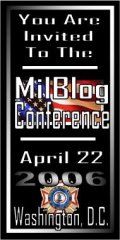A Gut Feeling of Opposition
When I heard the President suggest that the U.S. Military should be deployed on U.S. soil to aid in disaster recovery and to quarantine areas affected by fatal outbreaks of disease, my initial reaction was "no f*ing way!". Then I stopped and questioned that reaction. What was I afraid of?
In a speech given from the Rose Garden on Sept. 15th, the President said
Walter E. Williams discusses some reasons not to accept the President's proposition in A Nation of Sheeple.
Gov. A: I'm warning you - don't build another casino within 50 miles of my border! You're purposely draining my tax revenue!
Gov. B: Screw you! This is payback for your refusal to raise cigarette taxes to match mine.
Gov. A: That's it! You are presenting an eminent threat to my state and I'm calling in airstrikes on the next casino construction project you start!
Gov. B: Oh yeah? Just try it beotch, and watch how well your precious new amusement park stands up to a bunker buster!
I think the authority to use the military at home should remain extremely limited, and in the hands of the executive office.
In a speech given from the Rose Garden on Sept. 15th, the President said
It is now clear that a challenge on this scale requires greater federal authority and a broader role for the armed forces -- the institution of our government most capable of massive logistical operations on a moment's notice.Uh, lets not forget that certain areas of Mississippi were wiped out, but because of responsible state and local leaders, were able to start recovery efforts immediately without waiting for the Feds to literally bail them out. Maybe challenges on this scale just need leaders who will plan ahead, and then actually implement the plans when disaster makes it necessary.
Walter E. Williams discusses some reasons not to accept the President's proposition in A Nation of Sheeple.
The Posse Comitatus Act (18 U.S.C. 1385) generally prohibits federal military personnel and units of the U.S. National Guard under federal authority from acting in a law enforcement capacity within the United States, except where expressly authorized by the U.S. Constitution or Congress. Enacted during Reconstruction, the purpose of the Posse Comitatus Act was to severely limit the powers of the federal government to use the military for local law enforcement. Would Americans tolerate such a gigantic leap in the federalization of law enforcement? I'm guessing the answer is yes. In the name of safety, we've undergone decades of softening up to accept just about any government edict that our predecessors would have found offensive.Even more frightening would be the possibility of abuse by a future President *shudder* Clinton. That combination of megalomania and utter contempt for the military could be catastrophic. James Carafano of the Heritage Foundation suggests some alternatives in Critics of the Hurricane Response Miss the Mark in Focusing on Posse Comitatus.
Deploying the military faster, making it a more agile and flexible instrument to respond to all kinds of domestic security needs, is a question of force structure and policy. It does not require tampering with the sovereign responsibilities outlined in the Constitution. There are better solutions.But he envisions something that I also find disquieting:
Mix National Guard and Reserve forces. The Army Reserves, like the National Guard, are citizen soldiers. However, the Reserves are federal forces, meaning that they do not belong to the states in which they are based. Since assets indispensable to disaster relief are scattered throughout the Reserve components (both the Reserves and the Guard), disaster relief efforts should integrate both components resources and clarify lines of authority in a manner that preserves states autonomy in accordance with Posse Comitatus. Rather than amend the law to expand Federal authority, Congress could consider adding a provision that would allow federal Reserve units to function under state control during a natural disaster or other emergency situation. Under such a provision, states could draft their own emergency response plans and submit them to the Department of Defense (DOD) and Department of Homeland Security (DHS). In an emergency, the DOD could then marshal the resources and logistical support necessary to support state authorities. Such an arrangement allows states to tailor plans to their individual needs, to maintain unity and continuity of command, and to allow for coordinating the needs and costs of responding to disasters and other contingencies before the event.I don't like the idea of giving someone like Kathleen Blanco or Ray Nagin the use of Army reserve units! If we have reasons to retain restraints on what the CIC can do with the troops here at home, shouldn't we have even more reason to keep State leaders hands off of them? How could we ever rest assured that some nimrod governor wouldn't abuse this new authority?
Gov. A: I'm warning you - don't build another casino within 50 miles of my border! You're purposely draining my tax revenue!
Gov. B: Screw you! This is payback for your refusal to raise cigarette taxes to match mine.
Gov. A: That's it! You are presenting an eminent threat to my state and I'm calling in airstrikes on the next casino construction project you start!
Gov. B: Oh yeah? Just try it beotch, and watch how well your precious new amusement park stands up to a bunker buster!
I think the authority to use the military at home should remain extremely limited, and in the hands of the executive office.














<< Home